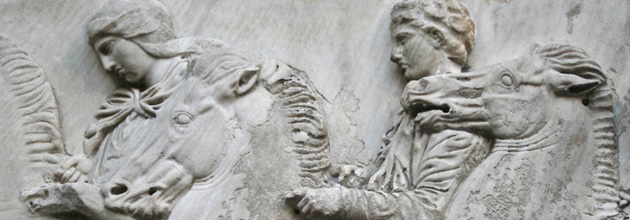
The Classics and the Liberal Arts
A case for the liberal arts
Before you focus in on classics, you may need to address a broader question. Should you major in something practical, something that will help you get a job immediately upon graduation? Or should you try to get the best education you can, an education that can serve you for the rest of your life?
You can, of course, try to have your cake and eat it too, by choosing a major that both educates you broadly and prepares you for a specific career. Or you can do two majors, one more practical and one more purely liberal artsy. But you will at least have to decide which sort of study to give more emphasis.
I call the sort of education that serves you for the rest of you life an education in the liberal arts, and you can guess what sort of education I prefer. But don't take my word for it. After all, we're trying to educate you so you won't need to take anyone's word for anything . . .
What are the liberal arts? An unfortunate paradox
Well, first of all we would, ideally, say just what the liberal arts are. But we could spend all day just discussing this topic. This brings us to an unfortunate paradox. Convincing someone to major in the liberal arts is a little bit like convincing someone that they will like chocolate, or caviar, or chitlins, before they've ever tasted them. You can't really understand what the liberal arts are until you've tasted them, until, that is, you've at least begun an education in the liberal arts. The liberal arts are, in some sense, an acquired taste. So the only way to convince someone to study the liberal arts is to get them to study the liberal arts.
Now some people are lucky enough to have begun a real education in the liberal arts during their high school years, whether in school or outside school, but others are never so lucky--some of them despite having had what officially counts as a college education. Some of these unfortunate illiberal souls are parents (and some are university administrators). To such wretches one can only offer the promise that once one has truly tasted the liberal arts, one will want to taste more. In fact, the liberal arts, unlike chocolate, caviar, or chitlins, can transform us, transform our interests, ideals, and values--to the point that we can't imagine our life without them.
Latin roots
The phrase liberal arts comes from two Latin words:liber, meaning free, and ars, meaning craft, skill, or art. Art in contemporary English is often restricted to the fine arts—painting, sculpture, and the like, but in Latin, an ars is an expertise, skill, or craft. In this sense carpentry is every bit as much an art as painting is, and there is no implied contrast between art and science.
Liberal in English has political implications, but in Latin the opposite of liber is not some word meaning conservative, but the word servus, which means slave. The liberal arts therefore ought to be the kind of expertise that suits a free person, or perhaps even one that helps make one free. Not all skills will qualify as liberal arts in this sense.Freedom
Free from what? Ah, a hard question, not the sort of question to be explained simply by Latin roots. The simplest answer is that the liberal arts are skills that we need as free men and women, not as slaves. They are skills, then, that we need as human beings, for our own sake, not skills which we could use merely to benefit someone else. The liberal arts are not skills which merely help us learn a living, for such skills could help us serve masters as well, but skills that allow us to lead full, happy, ethical lives as individuals, members of families, and citizens. They are not skills which only enable us to live but skills which free us to live well. This is not to say that such skills don't help in most jobs: they do. But that's not all they do.
Could you be a bit more specific about what counts as a liberal art?
Well, yes, I suppose so. Let's say, optimistically, that you're interested in the liberal arts. Just what should you major in?
I suppose I think first and foremost of majors in the humanities, like English, philosophy, history, art, music, and classics. But we should also probably include fields often referred to as social sciences: sociology, psychology, anthropology, and the like.
And most majors can be taught and studied humanely. Many schools use the term "arts and sciences" as a synonym for liberal arts, and the sciences, if treated liberally, including the "hard" natural sciences, are every bit as liberal as the humanities. And no modern education is complete without a serious encounter with the sciences. But a physicist who is trained humanely will not only know how to split an atom, but will have thought seriously about what natural laws are all about, or what makes for a good scientific theory, or a good scientific proof, questions that require thought every bit as liberal-artsy as the great issues of philosophy or history.
